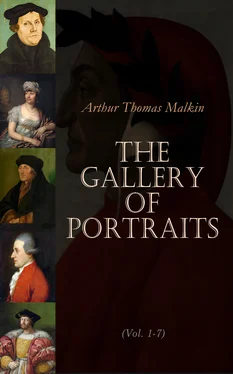In the year 1652 he was ordained priest, and, his talents having already made him known, he soon after received preferment in the cathedral church of Metz, of which he became successively canon, archdeacon, and dean. It was here that he published his Refutation of the Catechism of Paul Ferri, a protestant divine of high reputation. This was the first of that series of controversial writings which contributed, more than all his other works, to procure for him the high authority which he enjoyed in the church. He came forward in the field of controversy at a time when public attention was fixed on the subject, and when the favourite object both with Church and State was the peaceable conversion of the Protestants.
Richelieu in the preceding reign had crushed, by the vigour of his administration, the political power of the Protestant party. He, in common with many other statesmen, Catholic and Protestant, had conceived a notion that uniformity of religious profession was necessary to the tranquillity of the state. But, though unchecked in the prosecution of his objects by any scruples of conscience or feelings of humanity, he would have considered the employment of force, where persuasion could be effectual, to be, in the language of a modern politician, not a crime but a blunder. When therefore the army had done its work, he put in action a scheme for reclaiming the Protestants by every species of politic contrivance. The system commenced by him was continued by others; and of all those who laboured in the cause, Bossuet was indubitably the most able and the most distinguished.
His first effort, the Refutation of the Catechism, recommended him to the notice of the Queen-Mother; and the favour which he now enjoyed at court was further increased by the fame of his eloquence in the pulpit, which he had frequent opportunities of displaying at Paris, whither he was called from time to time by ecclesiastical business. He was summoned to preach at the chapel of the Louvre before Louis XIV., who was pleased to express, in a letter to Bossuet’s father, the great delight which he received from the sermons of his son; for the versatile taste of the great monarch enabled him in one hour to recreate himself with the wit and beauty of his mistresses, and in the next to listen with undiminished pleasure to the exhortations of a Christian pastor. But Bossuet had still stronger claims on the gratitude of Louis by converting to the Roman Catholic faith the celebrated Turenne. This victory is said to have been achieved by his well-known Exposition, written in the year 1668, and published in 1671.
So great was his influence at this time, that he was requested by the Archbishop of Paris to interfere in one of those many disputes which the Papal decrees against the tenets of Jansenius occasioned. The nuns of Port-Royal, who were attached to the doctrine and discipline of the Jansenists, were required to subscribe the celebrated Formulary, which selected for condemnation five propositions said to be contained in a certain huge work of Jansenius. Those excellent women modestly submitted, that they were ready to accept any doctrine propounded by the Church, and even to affix their names to the condemnation of the obnoxious propositions; but that they could not assert that these propositions were to be found in a book which they had never seen. In this difficulty the assistance of Bossuet was requested, who, after several conferences, wrote a long letter to the refractory nuns, highly commended for its acute logic and sound divinity. Much of the logic and divinity was probably thrown away upon the persons for whose use they were intended; but there was one part of the letter sufficiently intelligible. He congratulated them on their total exemption from all obligation to examine, and from the task of self-guidance; and assured them that it was their bounden duty, as well as their happy privilege, to subscribe and assent to every thing which was placed before them by authority. The nuns were not convinced. They escaped however for the present; but in the end they paid dearly for their passive resistance to the decision of Pope Alexander VII. on a matter of fact.
In the year 1669, Bossuet was promoted to the bishopric of Condom, which he resigned the following year on being appointed to the important office of Preceptor to the Dauphin.
History has told us nothing of the pupil, but that his capacity was mean, and his disposition sordid. To him, however, the world is indebted for the most celebrated of Bossuet’s performances. The Introduction to Universal History was written expressly for his use; and this masterly work may serve to confirm an opinion, entertained even by his friends, that Bossuet was not peculiarly qualified for his situation. To compose such a work for such a boy was worse than a waste of power.
Though devoted closely and conscientiously to the duties of his new office, he was not altogether withdrawn from what might be called his vocation, the prosecution of controversy. It was during the period of his connexion with the Court, that his celebrated conference occurred with the Protestant Claude. Mlle. de Duras, a niece of Turenne, had conceived scruples respecting the soundness of her Protestant principles, from the perusal of Bossuet’s ‘Exposition.’ She consulted M. Claude, who promised to resolve her doubts in the presence of Bossuet himself. The challenge was accepted, and the memorable conference was the result. Both parties published an account of it; and their statements, as might be expected without suspicion of dishonesty on either side, did not entirely agree. The lady was content to follow the example of her uncle.
Bossuet’s engagement with the Dauphin was concluded in the year 1681, when he was rewarded with the bishopric of Meaux. In so short a memoir of such a man, where only the most prominent occurrences of his life can be noticed, there is danger lest the reader should regard him only in the character of a controversialist, or in the proud station of acknowledged leader of the Church. It is the more necessary, therefore, in this place to observe, that, to the comparatively obscure but really important duties of his diocese, he brought the same zeal and energy which he displayed on a more conspicuous theatre; and that he could readily exchange the pen of the polemic for that of the devout and affectionate pastor.
Louis, however, was not disposed to leave the Bishop undisturbed in his retirement. He was soon called forth to be the advocate of his temporal against his spiritual master.
The Kings of France had long exercised certain powers in ecclesiastical matters, which had rather been tolerated than sanctioned by the Popes. Louis was determined not only to preserve, but considerably to extend, what his predecessors had enjoyed. Hence a sharp altercation was carried on for many years between him and the See of Rome. But, in 1682, in consequence of a threatening brief issued by that haughty pontiff, Innocent XII., he summoned, by the advice of his clergy, for the purpose of settling the matters in debate, a general Assembly of the Church. Of this famous Assembly Bossuet was deservedly regarded as the most influential member. He opened the proceedings with a sermon, having reference to the subjects which were to come under consideration. In this discourse the reader may find, perhaps, some marks of that embarrassment which he is supposed to have felt. He had the deepest sense of the unbounded power and awful majesty of kings in general, and the highest personal veneration for Louis in particular; but then, on the other hand, the degree of allegiance which he owed to his spiritual head it was almost impiety to define. So, after having illustrated, with all the force of his eloquence, the inviolable dignity of the Church, and fully established the supremacy of St. Peter, he carries up, as it were in a parallel line, the loftiest panegyric on the monarchy and monarchs of France.
Читать дальше












